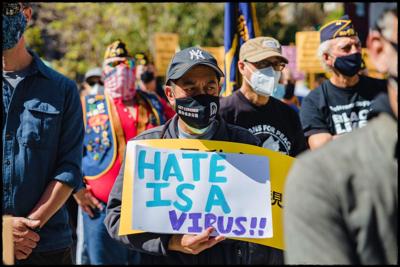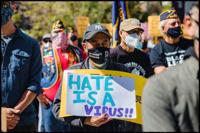California Conference for Equality and Justice (CCEJ), a non-profit organization that aims to eliminate bias, bigotry, and racism is one of the recipients of the Stop the Hate Funding (STH) for the 2021-22 fiscal year.
The Stop the Hate Funding totals $14 million divided among 80 organizations in California, including CCEJ, to combat hate incidents and crimes. In March, Gov. Gavin Newsom’s administration announced the complete lists of grantees that, with this money, could provide direct services and support to victims of hate incidents and facilitate hate incident prevention measures in their prospective cities/regions.
“This is a critical investment that will go a long way towards uplifting our communities and fighting hate and violence around the state,” Newsom said. “We aim to help victims of violence, but also prevent violence in the future. History shows we need to do better, and this helps us get there.”
About $14 million in funding was allocated by the California Department of Social Services (CDSS) Civil Rights, Accessibility and Racial Equity (CARE) office. As stated online by the Governor Newsom’s administration, these funds were approved in last year’s state budget as part of his 2021 California Comeback Plan and included $166.5 million dedicated to combating bias-motivated attacks.
CCEJ is based in Long Beach and is part of the 25 recipients based in Los Angeles County, which received the largest monetary amount ($4,514,724) out of the $14 million, followed by the Bay Area/South Bay/Central Coast, which received a total of $4,168,747.
The $14 million was dispersed throughout California and divided among the following regions: Bay Area/South Bay/Central Coast, Border Region, Los Angeles County, Orange County/Inland Empire, and Northern California/San Joaquin Valley. The funds come at a time when the country in recent years has been heavily impacted by ââhate-driven violence, including California.The number of state victims of reported hate crimes increased 41.9%, from 1,536 in 2020 to 2,180 in 2021, according to the Hate Crime report by the California Department of Justice.
The same report states that hate crime events involving a racial bias overall increased by 33% in 2021. Anti-Hispanic or Latino events rose from 152 in 2020 to 197 in 2021, by a whopping 29.6%. But in California, the Asian Pacific Islander (API) community has seen the highest increase in Anti-Asian bias events, from 89 events reported in 2020 to 247 in 2021, a 176% increase.
These alarming numbers have driven the work of CCEJ, which next year will celebrate 60 years of experience and community engagement. “It’s devastating when you look at hate crime data in our cities. The freedom to just live, work and play with liberation has been taken away from many communities of color,” Reena Hajat Carroll, CEEJ’s Executive Director, said. “They are scared to leave their house, scared to go to the grocery store, to take public transportation, and they are scared for their children, and living with that fear is unjust and unfair.”
Through an education, conflict resolution, anti-oppression and advocacy framework, CCEJ has created a diverse range of programs and training that support the development of critical consciousness, positive identity development, and leadership skills. As stated on the organization’s website: “CCEJ incorporates restorative and transformative justice practices, peer support and mentorship, and coaching to help youth and adults increase their socio-emotional wellness, resiliency, and ability to address conflict using healthy restorative strategies.”
Carroll mentioned that this fund will help their youth programming, which is open to high school and college students. “We bring young people together throughout the year in something that is called the Building Bridges Camp, where they talk and learn about things like sexism, ageism, nationalism, and many other isms,” she said. “After learning about these issues, students become ambassadors in their schools to stop hate, bias, and bullying.”
CCEJ’s youth programs help students get the skills and confidence to facilitate conflict or intervene when they see or hear something offensive or hurtful to their peers, she said. The recipients of the Stop the Hate funding are awarded for the service period of April 15, 2022, through April 14, 2023. Stop the Hate services can fall under the following categories: direct services: prevention services or intervention services.
Direct services include things like mental health and complementary health services, legal services, case management, and referrals. Prevention services are those initiatives that work across racial groups and other impacted populations to strengthen alliances and promote understanding, this can include youth development, senior safety, ambassador/escort programs, individual and community safety planning, bystander training, and other de-escalation techniques. Intervention services include outreach and training on the elements of hate incidents and hate crimes, services for survivors, and the legal rights of survivors, as well as coordination and liaising with local government and other institutional partners.
Kim Johnson , CDSS Director said that this funding shows the guiding efforts of the golden state. “These investments show once again that California leads,” said Johnson. He also said that the partnership with the selected organizations will help “stem the tide of hate incidents in California and provide the communities impacted by them with the resources they need.”
The United States Department of Justice defines hate crimes as crimes “motivated by bias against race, color, religion, national origin, sexual orientation, gender, gender identity, or disability.”
Carroll said that one of CEEJ’s main goals is to build a safe space, as she acknowledges that talking about anti-hate incidents or racism can be a complex topic to be vulnerable about.
“One of the approaches we use is breaking into affinity groups [is that]we have a Latinx affinity group, a Black affinity group, APPI affinity group, and a biracial and White affinity group, so that people feel some comfort when talking about challenges we face based on our identities, “ she said. “We also have multi-racial group meetings so that attendees can build healthy relationships and dialogue with people of different identities, cultural backgrounds, and races.”
According to their annual report, in 2021 CCEJ provided anti-bias education to 20 high schools, including “Conscious Classrooms programming” for Whitney High School in Cerritos, CA. In June, CCEJ also hosted the first-ever “Racial Justice Roots Convening,” where a total of 100 attendees learned and grew their skills in anti-racist practices, and connected to build solidarity for racial justice. Throughout the year, CCEJ also held dialogues to support people impacted by anti-Asian hate and police violence as well as trained those in their programs to address bias and bigotry. As a result of these dialogues, Carroll represented the organization at a roundtable discussion in October 2021 on anti-hate action and hate crimes organized by CA Attorney General, Rob Bonta.
This year the Stop the Hate Funding granted CEEJ with $100,000 to continue the work they are doing but Carroll said that the organization has not been notified if the funds will be renewed next year, but she is hopeful. “We want to continue to do this type of work, it’s important for us and to our community and we truly believe in our approach, which puts restorative justice and relationships at the forefront, “ she said. “Our work stems from an emotional and personal space; it is not just about presentations and prescribed set of guidelines, it’s getting to know each other. CCEJ believes that for people to have bold and authentic conversations about racism and discrimination, we need to be in relationships with one another and open to having these hard conversations.”
CCEJ services about 7,000 to 8,000 people annually and in 2021, 78% of their expenses went to their program services. For additional information on CCEJ and their work, you can visit their website or join their email list HERE.











(0) comments
Welcome to the discussion.
Log In
Keep it Clean. Please avoid obscene, vulgar, lewd, racist or sexually-oriented language.
PLEASE TURN OFF YOUR CAPS LOCK.
Don't Threaten. Threats of harming another person will not be tolerated.
Be Truthful. Don't knowingly lie about anyone or anything.
Be Nice. No racism, sexism or any sort of -ism that is degrading to another person.
Be Proactive. Use the 'Report' link on each comment to let us know of abusive posts.
Share with Us. We'd love to hear eyewitness accounts, the history behind an article.